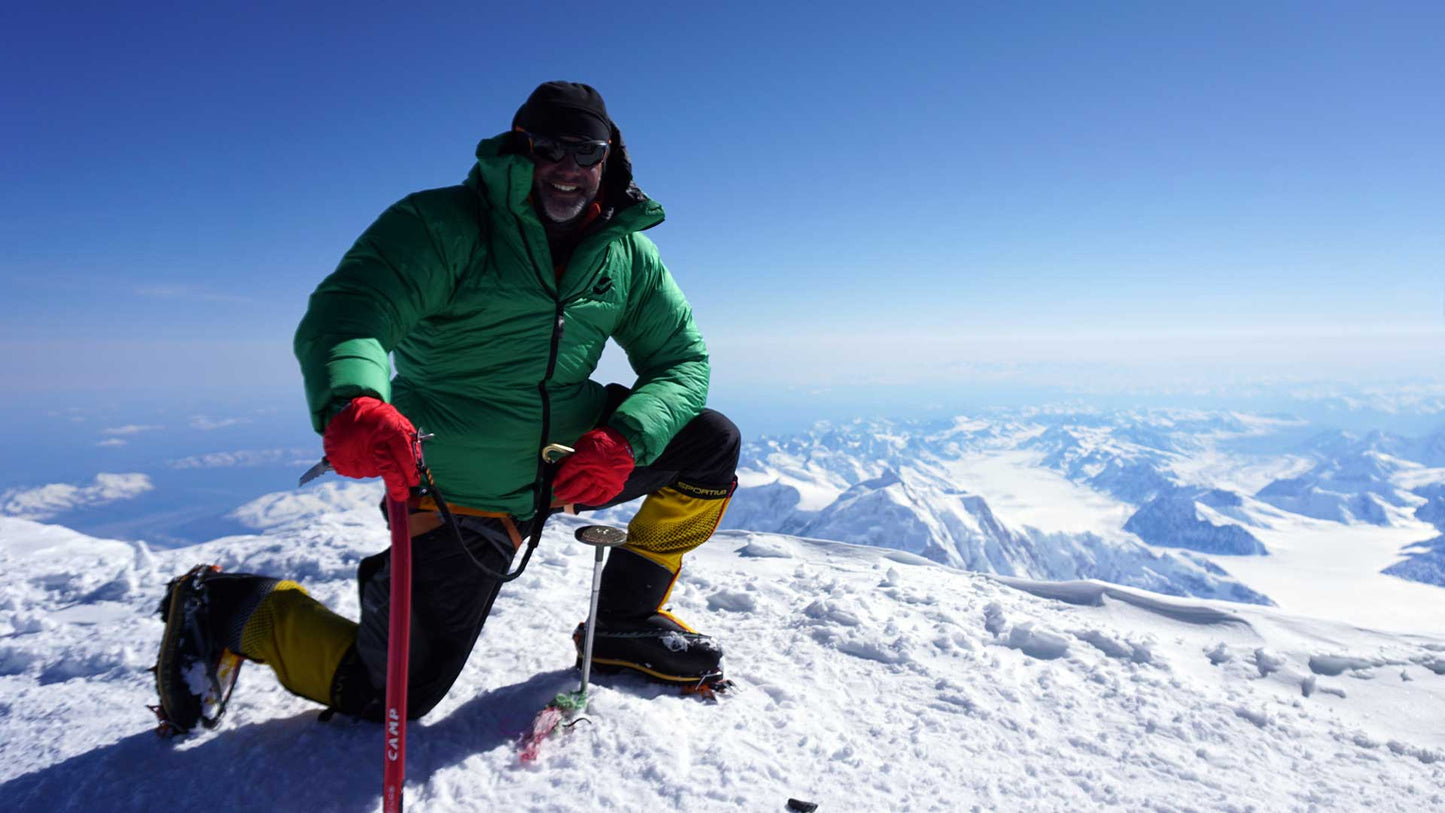
The most important thing I learned when speaking with Dave is that you should always have a pen and paper available when Dave is speaking. Even in a short, casual conversation, Dave is going to drop some wisdom that you’ll want to write down. These notes will be things you want to remember and reflect on in the future.
Dave’s perspective is a result of decades spent as a Marine fighter pilot, mountaineer, and backcountry hunter. Dave’s experience is as deep as his curiosity — a combination that has created an intriguing depth of wisdom.
In a recent Hunt Backcountry Podcast episode with Dave, we discussed some of his note-worthy “sayings” and what they mean for hunters.
That podcast episode and this article will only scratch the surface of what we can learn from these sayings. However, limited as it will be, here is my reflection on Dave’s sayings and what personal insights I have taken from his words.
"Work from the target area backward."
David learned this lesson from the military, and it aligns perfectly with one of Steven Covey's famous habits, "Begin with the end in mind."
As hunters, we should think very critically and specifically about what a successful hunt looks like and how that result can be achieved. With that precise vision of success in mind, we need to then work our way backward and identify the steps needed to reach our goal.
As we work from the target backward, we will make decisions about tactics, strategies, gear, mindset, physical capabilities, and more.
It is common for hunters to ask questions about which rifle cartridge is better than another, which shelter is better than another, or which jacket is better than another. And the answer is, "Better for what?"
Many questions can only be answered effectively once a final goal is established and the path to that goal has been identified.
Identifying the "target area" of your hunt — including the specific place, time, weather, seasonal behavior of the species, and more — will inform what you need to arrive at your desired outcome. Be as specific as possible about what your shot opportunity will be like, how you created that opportunity, what it took to get there, and what was needed to enable all of that to happen.
Whether you are hunting high country mule deer with a bow in late-August, pursuing late-season elk with a rifle, or taking a once-in-a-lifetime trip to Alaska — work from the target area backward.

"Hike half as fast; think twice as much."
I spend most waking hours of my normal, day-to-day life filled with noise, distractions, obligations, and other preoccupations. My mind and body are both accustomed to a hectic pace of constant stimulation. Because of this, it often takes me a couple of days to settle into the pace of nature when I embark upon a backcountry hunt.
My frenzied "default pace" is something I naturally carry over into hunting. I want to go, go, go. Climb that mountain. Crest that ridge. See what's on the other side.
However, a hurried body and distracted mind are not only ineffective for hunting, but they are also foolish and dangerous ways to act in the backcountry. In fact, rather than thinking of yourself as a separate being acting in the backcountry, make it your goal to slow down enough that you become part of what is happening in your environment.
Mistakes are made when we put action ahead of understanding. A mistake may be our clumsy movement that jumps the bedded buck we could have otherwise killed. Or a mistake may be a misstep that results in a potentially life-threatening injury.
By hiking half as fast and thinking twice as slow, we dramatically increase our chances of coming home with a punched tag and full pack. And, well, increase our chances of coming home at all.
When you enter into the domain of the wild, you are a foreign presence. You are stepping into the natural patterns and rhythms of life that exist in wild places, and are shared by wild things. To become a part of that domain, you have to hike half as fast and think twice as much.
"See what you’re looking at; hear what you’re listening to."
Have you ever driven to a familiar place (work, home, etc) and arrived at that place only to realize that you don't remember driving there? You made numerous decisions about which direction to head, where to turn, and more — but you weren't aware of making those decisions.
That is just one example of not being aware of your surroundings and your actions.
In hunting, the smallest of details often have significant consequences. Hearing the faint sound of a distant bugle can lead you to kill the bull of your dreams. Seeing a slight flicker of white through your binos may help you locate the bedded buck. Hearing the subtle snap of a stick may alert you to the bear that is walking on pads through the timber.
If you are in a place, but not fully aware of your surroundings, you are not truly present in that place. If your body is in the backcountry but your head is at home, you are not going to be an effective hunter.
If you are lost in thought about what tomorrow may bring, you can't truly see what is in front of you. If you are preoccupied with a recent encounter that didn't go your way, you can't hear what you're listening to.
Once you physically slow down (hike half as fast) in the domain of the wild, you must choose — with effort and intention — to see what you are looking at and hear what you are listening to.
Keep your mind where your feet are.

"Never let your expectations exceed your capabilities."
This is a hard, helpful truth. Our culture is saturated with the idea that anyone can do anything. But that cultural half-truth doesn't tell the whole story.
I firmly believe that our capabilities can drastically exceed the false limitations that many of us have placed upon ourselves. But I know that breaking through barriers in our capability only comes through the stress and trial of pushing our limits to develop that increased capability.
When there is a disconnect between our expectations and capabilities, we can correct the imbalance in two ways. We can lower our expectations, which may be helpful in the short-term, and will help us face the true reality about our current capabilities. Though lowering our expectations can, and should, leave us dissatisfied in the long run.
The other way we can reconcile the balance between our expectations and capabilities is to increase our capabilities. This is where the magic happens. When you come face-to-face with your deficiencies, you have identified an opportunity to improve.
When you willingly seek the adversity needed to attack your short-comings, you are increasing your capacity and can justifiably raise your expectations.
Set high expectations for yourself and your hunts, then do the hard work required to develop the capacity that is needed to meet, or exceed, those expectations.
"The trophy on the wall doesn’t make the hunter."
I have said in the past that I am not a trophy hunter or a meat hunter. I am an experience hunter.
Of course, I don't expect everyone to agree with my perspective or align with my motivations for hunting. And whether or not you have plenty of antlers or horns on your wall, it is helpful to remember that the trophy on (or missing from) the wall doesn't make the hunter.
Psychologists have defined categories of behavior as being either process-oriented or results-oriented.
As the names of each category imply, the process-orientation is more concerned with how a goal is pursued, and the results-orientation is more concerned with ensuring the goal is achieved.
A balance of being driven by both process and results is healthy and effective in the long-run. This is true for life in general, as well as for hunting specifically.
By reminding ourselves that "the trophy on the wall doesn't make the hunter", we bring balance to the process and the results; allowing us to appreciate the successful hunts, and to also find value in hunts where our actions exceeded the outcomes.
The trophy-taker is not always a hunter. And the hunter is not always a trophy-taker. It is the pursuit, not the result, that defines.
Mark Huelsing is the host of the Hunt Backcountry Podcast and works at Exo Mtn Gear — though he's never been able to figure out his job title. Connect with Mark by sending him an email (mark at exomtngear.com) or connecting on Instagram, @MarkTheFark.
